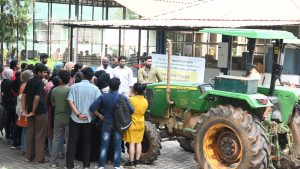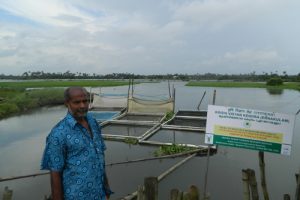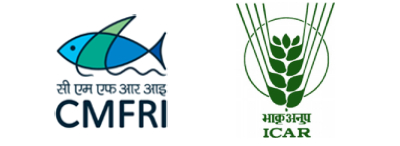Cool season vegetables like cabbage, cauliflower, beetroot, carrot and onion hold a major share among vegetables in an average Keralite’s diet, whereas all these produce comes from other states. In this circumstance KVK has undertaken demonstrations on NS-60, Pusa meghna varieties of cauliflower and NS-163, NS-183 varieties of cabbage in 20 locations of Ernakulam district. NS-60 of cauliflower and NS-163 of cabbage were found to be promising varieties which recorded 33.8 MT/ha and 38.5 MT/ha productivities respectively in Ernakulam. These varieties are found to be well suited for the district’s agro climatic conditions. KVK popularized these as homestead crops to ensure safe vegetable production organically. These crops are grown in rooftop gardens and in kitchen gardens. KVK imparted trainings to 168 farmers, 3 residents associations and 5 SHG groups on cool season vegetable cultivation. In order to create interest among students, KVK set up demonstration plots in FISAT Engineering college., St Pauls College, Kalamassery and VHSE, Thirmaradi Secondary school. The carrot variety super kuroda was demonstrated in KVK organic farm. On farm testing on onion cultivation taken up during 2010 in 5 locations in Ernakulam district. An FLD on “Agrifound Dark Red” variety of onion is on going presently at 5 locations in Ernakulam. In order to further popularize growing of these varieties KVK is making all efforts to supply seedlings of cool season vegetables from September end to mid November through KVK’s seedling production unit.
Rain shelters solve the hassles of cultivating vegetables during rainy season. The harmful effects of rainwater during high precipitation time which is falling directly on crops can be avoided in rain shelters. The infestation of diseases and pests are less when grown in rain shelter. KVK has done 3 demonstrations on rain shelters in the fields of Mr. Ramakrishnan, Kangarappadi, Mr. Manuel at kattipparambu and Mr. C V Mathew, Kumbalangi. They respectively produced 325,280 and 195 kg of vegetables from rain shelters of 40 m2 area during the rainy season in the months of June to December. The farmers learned that vegetable forcing or off season vegetable cultivation is possible if cultivation is done in rain shelters. Arka Anamika variety grown to 8 ft height inside rain shelters at Mr.Ramakrishnan’s rain shelter. General increase in yield up to 2.5 times compared to the raised bed system of planting was observed in all rain shelters. The quality of fruits harvested from rain shelters was also good. The construction cost of rainshelter for one cent area is Rs.7500 and this structure can be used for 4-5 years.
Subsequent to the demonstrations KVK received 200 numbers of enquiries from farmers. Farm Information Bureau of Kerala is presently acknowledging KVK’s intervention in rain shelters and considering KVK Ernakulam as the resource centre on rain shelter management. KVK also created a rain shelter task force and trained them on rain shelter construction.
Maize is considered as one of the most important cereal crops in the global agriculture economy both as food and fodder crop. But it is not being cultivated in Kerala, whereas maize products like fresh cobs, corn starch, corn flakes, baby corn, sweet corn, etc. are being widely consumed by Keralites. In addition, maize is an integral part of feed for cattle, poultry and fish. Grains are available in the market for using as feed stuff. By knowing the importance of Maize, KVK conducted an experiments and proven that maize can be grown in all seasons in Kerala with an average production of 5 MT /ha. Subsequently maize cultivation introduced in farmers fields first time in Kerala during 2011-12. Main advantage of the Maize is hardiness to grow in adverse conditions with minimum care. KVK demonstrated Maize as a suitable crop for intercropping in Coconut gardens, tapioca, and cowpea. Presently more than 500 farmers are doing Maize cultivation in Ernakulam district. KVK has also developed marketing linkages for fresh cobs.
Palak is a rich source of Vitamin A, B, C and Ca etc and nutritionally better than the common leafy vegetable of Kerala-Amaranthus. Palak is a traditional leafy vegetable cultivated extensively in North India and is not popular in Kerala. KVK introduced Palak cultivation and popularised its nutritional properties in Ernakulam. Varieties like All green and Harit Shobha were tested and found a production of 2MT/ha and 2.2 MT/ha respectively. KVK started supplying Palak seeds round the year. So far 25 kg seeds were distributed, which can cover an area of 1.5 ha. The outcome of the programme is that 2.5 ha of Amaranthus fields in Ernakulam got converted to Palak ensuring more nutritional security.
Jasmine is the most commonly used flower in Kerala during all occasions, whereas jasmine cultivation did not exist in the district till 2001. Jasmine cultivation was in a primitive stage in Ernakulam district till 2005. By understanding the importance of this crop, KVK started training programmes, farmers meet, field visits, consultancy, and technical guidance during 2006-2007. Jasmine growers Association in the villages Parur, Kuzhipilly, Edavanakad, Narakkal, Elamkunnapuzha, Puthuvype, Irapuram, Pallikara, Parakodu, Pattimattam, and Mazhuvanoor formed. Pot cultivation was advocated initially and 20 farmers started this venture in Edavanakad. A society was formed for flower procurement and marketing namely Kutimulla Karshagasamithi It has a membership of 100 registered Jasmine farmers at present. The society caters to the need of the farmers by way of supplying fertilizer, pesticides and fungicides. The society also functions as a collection centre for bulk marketing. The society makes and markets bouquet and garlands which gives employment to rural women and also gives more income which is shared among the members. Subsequently societies were formed in Narakkal, Elamkunnapuzha, Mazhuvanoor and Kunnathunad also. These societies have a total membership of more than 250 farmers. An average 2000 kg of jasmine flower per day has been produced and sold locally and also exported in the district. A district level Jasmine grower’s co- operative society has also been formed by the cultivators with 1080 registered members. The KVK intervention created total area of 50 ha in the district under Jasmine cultivation.



